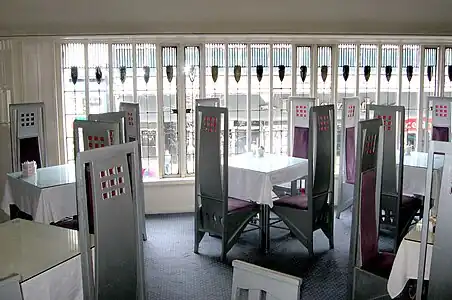1903 in Scotland
Events from the year 1903 in Scotland.
| |||||
| Centuries: |
| ||||
|---|---|---|---|---|---|
| Decades: |
| ||||
| See also: | List of years in Scotland Timeline of Scottish history 1903 in: The UK • Wales • Elsewhere Scottish football: 1902–03 • 1903–04 | ||||
Incumbents
- Secretary for Scotland and Keeper of the Great Seal – Lord Balfour of Burleigh to 9 October; then Andrew Murray
Law officers
- Lord Advocate – Andrew Murray until October; then Charles Dickson
- Solicitor General for Scotland – Charles Dickson; then David Dundas
Events
- January – East Fife Football Club is established.
- 12 February – the North British Locomotive Company of Springburn in Glasgow is formed by merger of Sharp, Stewart and Company, Neilson, Reid and Company and Dübs and Company. In April it receives its first new order for steam locomotives, from India.[1]
- March – Ferguson Shipbuilders established at Port Glasgow.[2]
- 3 March – the British Admiralty announces plans to build Rosyth Dockyard as a naval base on the Firth of Forth at Rosyth.
- April – Norwegians begin whaling from Shetland.[3]
- 14 April – Aberdeen Football Club is established.[4]
- 10 June – the floral clock in Princes Street Gardens, Edinburgh, begins operation, the world's first.[5]
- 1 July – opening of Wick and Lybster Light Railway.
- 27 July – Glasgow St Enoch rail accident: 17 are killed when a Glasgow and South Western Railway train collides with the buffer stops at St Enoch railway station.[6]
- 2 August – Pittencrieff Park is gifted to the people of Dunfermline by Andrew Carnegie.[7]
- 24 August – opening of Ballachulish branch railway, including Connel Bridge over the Falls of Lora.
- October – opening of Willow Tearooms in Sauchiehall Street, Glasgow, designed by Charles Rennie Mackintosh for Catherine Cranston.
- 7 October – Perth Corporation Tramways take over the horse-drawn operations of the Perth and District Tramways.
- 31 October – opening of Hampden Park football ground in Glasgow.[8]
- 9 December – opening of Glasgow East End Industrial Exhibition.[9]
- Northern Lighthouse Board lighthouses: Construction of Scalasaig Light on Colonsay (Inner Hebrides; by David Alan Stevenson) and navigation light on Lady Isle (Firth of Clyde).
Births
- 15 January – Hugh Fraser, retailer (died 1966)
- 3 February – Douglas Douglas-Hamilton, 14th Duke of Hamilton, peer and pioneering aviator, chief pilot of the first flight over Mount Everest in 1933 (born in London; died 1973)
- 15 March – Charles Donaldson, Conservative politician (died 1964)
- 9 April – Marion Ross, physicist (died 1994)[10]
- 23 April – Ian Collins, tennis player, representing Great Britain in the Davis Cup (died 1975)
- 24 April – Joseph Macleod, poet, actor, playwright, theatre director, theatre historian and BBC newsreader (born in London; died 1984)
- 15 May – William MacTaggart, painter, known for his landscapes of East Lothian, France, Norway and elsewhere (died 1981)
- 17 June – William Vallance Douglas Hodge, mathematician, specifically a geometer (died 1975)
- 2 July – Alec Douglas-Home, Baron Home of the Hirsel, British Conservative politician, Prime Minister from October 1963 to October 1964 (born in London; died 1995)
- 3 July – David Webster, arts administrator (died 1971 in England)
- 28 July – Keith Murray, academic and Rector of Lincoln College, Oxford (died 1993)
- 9 August – Emil Fischbacher, Protestant Christian missionary to Xinjiang, with the China Inland Mission (died 1933)
- 5 September – Harry Harvey Wood, literary and artistic figure, a founder of the Edinburgh International Festival (died 1977)
- 31 October – Ian Smith, international rugby player (died 1972)
- 19 December – Andrew Murray, Lord Provost of Edinburgh 1947 to 1951 (died 1977)
- 29 December – George Elrick, bandleader and disc jockey (died 1999)
- Undated
- Oliver Brown, nationalist political activist (died 1976)
- Ben Humble, writer and climber (died 1977)
- Hector MacAndrew, fiddler (died 1980)
Deaths
- 3 February – David George Ritchie, philosopher (born 1853)
- 7 March – Hely Hutchinson Almond, rugby player and educationalist (born 1832)
- 17 May – John Ross, Australian drover and explorer (born 1817)
- 19 May – John Scott, shipbuilder (born 1830)
- 3 July – Matthew Holmes, steam locomotive designer (born 1844)
- 31 August – William Hastie, clergyman and theologian (born 1842)
- 18 September – Alexander Bain, philosopher and educationalist (born 1818)
- Undated – Thomas John MacLagan, Dundee doctor and pharmacologist (born 1838)
The arts
- Hill House, Helensburgh, designed by Charles Rennie Mackintosh
- "Hector the Hero", a classic lament, composed by James Scott Skinner
References
- Nicolson, Murdoch; O'Neill, Mark (1987). Glasgow: Locomotive Builder to the World. Edinburgh: Polygon. ISBN 0-948275-46-4.
- Goodwin, Karin (5 March 2007). "History of a shipbuilding family". BBC News.
- Evans, Peter. "Whales and Dolphins in Shetland Waters". Nature in Shetland. Archived from the original on 27 September 2016. Retrieved 25 September 2016.
- Stirling, Kevin. "Aberdeen v Dundee". Aberdeen Football Club. Archived from the original on 16 March 2017. Retrieved 25 February 2014.
- "History of Edinburgh". Visions of Scotland. Archived from the original on 14 February 2015. Retrieved 25 February 2014.
- "Accident Returns: Extract for Accident at Glasgow St Enoch on 27th July 1903" (PDF). Retrieved 10 February 2008.
- "Mr. Carnegie And Dunfermline". The Times. No. 37153. London. 7 August 1903. p. 10.
- Penguin Pocket On This Day. Penguin Reference Library. 2006. ISBN 0-14-102715-0.
- "Glasgow East End Industrial Exhibition". Exhibition Study Group. 2004. Archived from the original on 11 July 2015. Retrieved 1 August 2014.
- "Marion Ross (1903-1994)". National Records of Scotland. Retrieved 15 November 2021.
This article is issued from Wikipedia. The text is licensed under Creative Commons - Attribution - Sharealike. Additional terms may apply for the media files.

